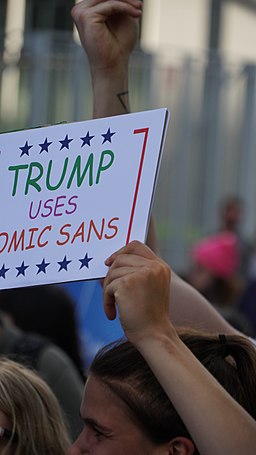
I have little doubt that experiencing feelings of outrage in response to political news one does not like is common. If you are a liberal living in the U.S., you are likely outraged over much of what the Republican Party does when in power. If you are a conservative living in the U.S., you are probably outraged over much of what the Democratic Party does when in power. That's not to say that your outrage is always justified, of course. You could, for example, become outraged on the basis of something you've misinterpreted or some false information you've erroneously accepted as true. Still, I think most of us would agree that experiencing strong negative feelings in response to something your political opponents are doing is normal. We've all been there. Some of us seem to be there several times a day every day.
My question for this post is not about whether it is normal, understandable, or healthy to experience these feelings but whether it is helpful to express them by calling our political opponents names on social media. At the moment, I'm unhappy with the tax bill Congress recently passed. If I take to social media to insult the members of Congress who voted for it, am I helping? If I label all Republican voters in extremely negative terms, am I helping? If I take advantage of every opportunity that comes my way to make disparaging comments about Donald Trump or those who voted for him, am I helping?
Is calling people names on social media an effective strategy for bringing about the political change I seek? How does it advance my cause (e.g., my desire to have a future Congress replace this tax bill with something better) to behave like this?
One possibility is that the sort of uncivil name-calling to which I am referring here really is helping. I'm not sure how it could help, but I cannot be certain that it is not helping in any way. Maybe it is helping in ways I can't see or haven't thought of yet. A second possibility is that social media name-calling has no effect whatsoever. Maybe it is similar to prayer in that it makes me feel better temporarily while having no real effect on anyone else. A third possibility is that the social media name-calling is making things worse. Perhaps it is contributing to conflict, polarization, and tribalism, things about which some of us still complain. Or maybe it is undermining compromise, civility, and other things some of us still claim to value.
Of these three possibilities, the last one (i.e., that insulting those I regard as my political opponents may be causing harm to the causes I claim to value) strikes me as the most likely. During the last few months, I have seen several people on Twitter with the word "humanist" in their bios insulting those with different political views. Republicans are "poison," "fucking worthless," and "Nazis;" Democrats are "children," "clueless morons", and "libtards." This has led me to question whether humanism is what I thought it was, but that is a topic for another post. For now, I want to stay focused on whether this sort of thing is helping, having no effect, or hurting.
When I see people doing this on social media, I find that it lowers my opinion of them. It doesn't matter whether they are liberals doing this to conservatives or conservatives doing it to liberals; I find myself thinking something like, "It is getting harder to find rational people on Twitter" or "It is too bad that this is what passes for discourse these days." I recognize that this does not necessarily support my suspicion that name calling is making things worse. After all, I might be the only one who has such a reaction to it.
In any case, the original question holds: how does calling your political opponents names on social media advance any of the causes you care about? How is it helping? And if you thought that it might be hurting rather than helping, would you continue to do it?